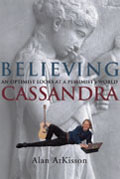Of all the tragic characters in Greek myths, the one who gives me the most shivers is Cassandra. The god Apollo gave her a wonderful gift — the ability to foretell the future — then followed it up with a terrible curse — no one would ever believe her. I can just imagine Cassandra, standing there inside the walls of Troy, yelling, “No, no, whatever you do, don’t haul that big wooden horse in here!”
Now a friend of mine has written a book called Believing Cassandra. (I have to acknowledge a strong positive bias for this author and this book from its very beginning.) His name is Alan AtKisson, and the question he asks is, what if you come to believe Cassandra?
What if you believe the modern Cassandras who say the climate is changing, the ecosystems are disappearing, the human enterprise is unsustainable and heading for disaster? You know, those unlistened-to folks who keep yelling, “No, no, whatever you do, don’t haul those gas-guzzling, air-polluting sports utility vehicles in here!”
Alan believes those folks. Furthermore, he believes that Cassandra’s curse can be broken, in fact is just asking to be broken, because the gift of prophecy and the curse of being ignored must run together and therefore can be broken together. If no one listens to warnings, the prophets of doom will be right. But if people listen, they will ward off disaster, and the prophets will have egg on their faces.
Alan has crafted an unusual book from this insight. On one hand, it’s a clear, sober catalog of the warnings being issued at this turn of this century and millennium. On another hand, it’s a cheerful argument about why none of those warnings has to come true. And (would someone please fetch me a third hand?) it’s a series of sketches from Alan’s own adventurous life about what happens to a person who dedicates himself to proving Cassandra wrong.
I’d guess that everyone will read the sketches first.
They range from a terrifying bus trip in Malaysia on a rainy night with no windshield wipers and no lights (“Obviously I survived”) to a meeting with Al Gore, back when Alan hoped he might actually exhibit strong environmental leadership. From leading a workshop with a group of Macedonian environmentalists (without understanding Macedonian), to singing a love song to a herd of German cows.

Alan AtKisson, a modern minstrel.
Everywhere Alan goes, he sings. He wards off doom and gloom with his head, as a writer and consultant, and with his heart, as a minstrel and composer. His steady companion on his journeys is his guitar. More than once I’ve seen him sum up a conference on endocrine disrupters or sustainability indicators with a rollicking ditty that he wrote overnight and that gets the point across much better than the scientific report.
Some of his songs are funny, some are lyrical and moving, a few, especially the earliest ones he wrote, are just plain dismal.
Pull up a star and hear my tale of woe.
I built a planet just a few billion years ago.
It was a lovely little blue-green ball.
One of my life-forms became self-aware,
They started messin’ with my recipe for air,
And now that planet’s got no life at all! Yeah, it’s a
Dead Planet
(Yeah, I’m just gettin’ back from the funeral)
Dead Planet
(Don’tcha hate it when they leave the casket open?)
I got them old Dead Planet Blues.
Well, that’s what happens first, when you believe Cassandra. You get depressed. But the depression doesn’t last. You begin to see how to make her wrong. Then you discover how much exciting, practical, doable work there is to do and fun there is to have in the process.
What I like especially about Alan’s book is that his response to believing Cassandra is so different from mine. I’m a country creature; I hang out on organic farms. He’s a city animal; he hangs out in boardrooms and in bars where the music is good. I spend a lot of time alone with computers and statistics; he works with groups, often large groups. I write opinion columns; he writes songs.
Who would guess that songs could help save the world? Alan would, and that’s the biggest point of his book. Once you believe Cassandra, there’s no one right or best thing to do. Wherever you are, whatever you’re good at, whatever you do with ease and joy, you can contribute in ways large and small to turning away from the doom.
Especially if you can do it with both your mind and your heart, with humor and fun, even with song.


